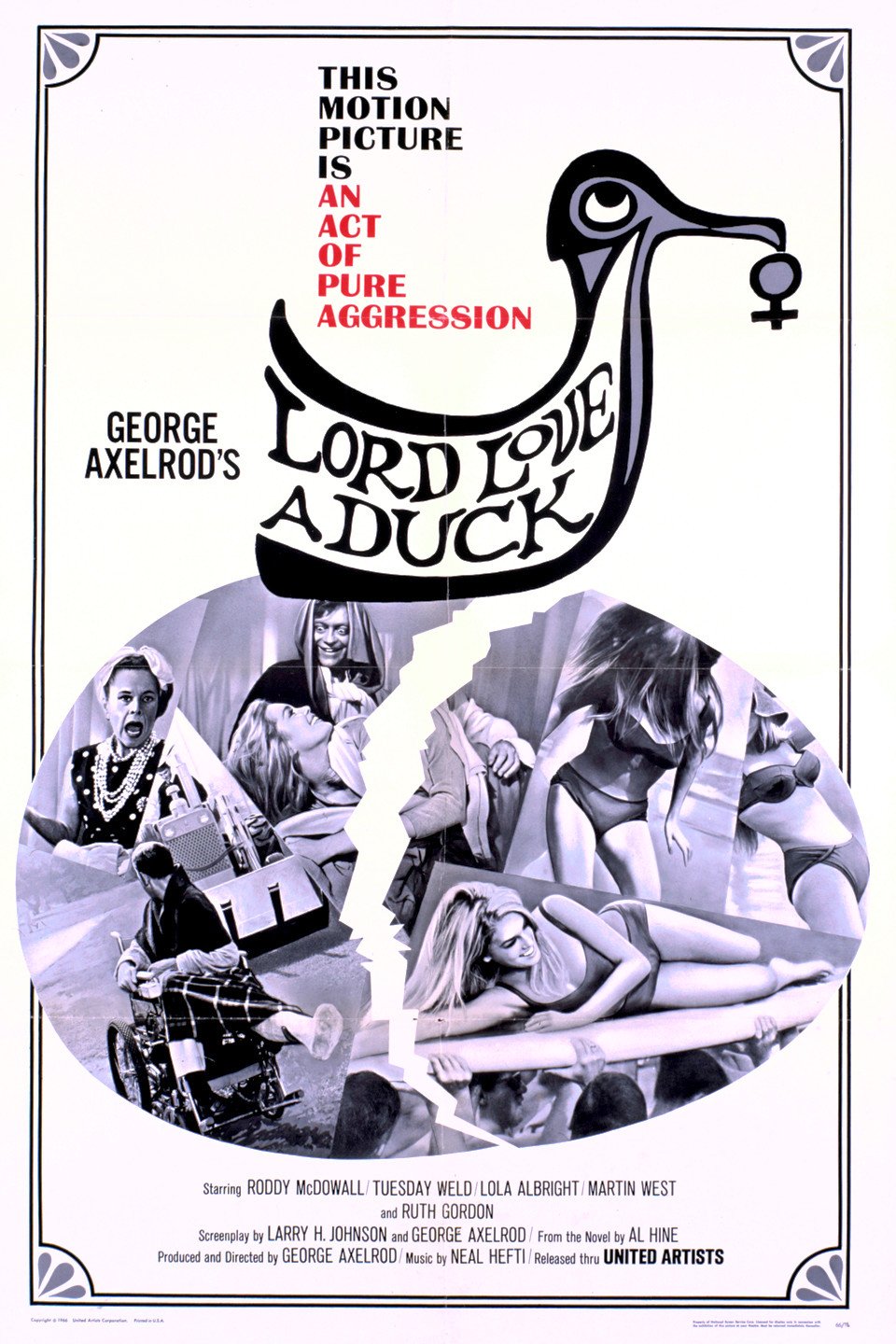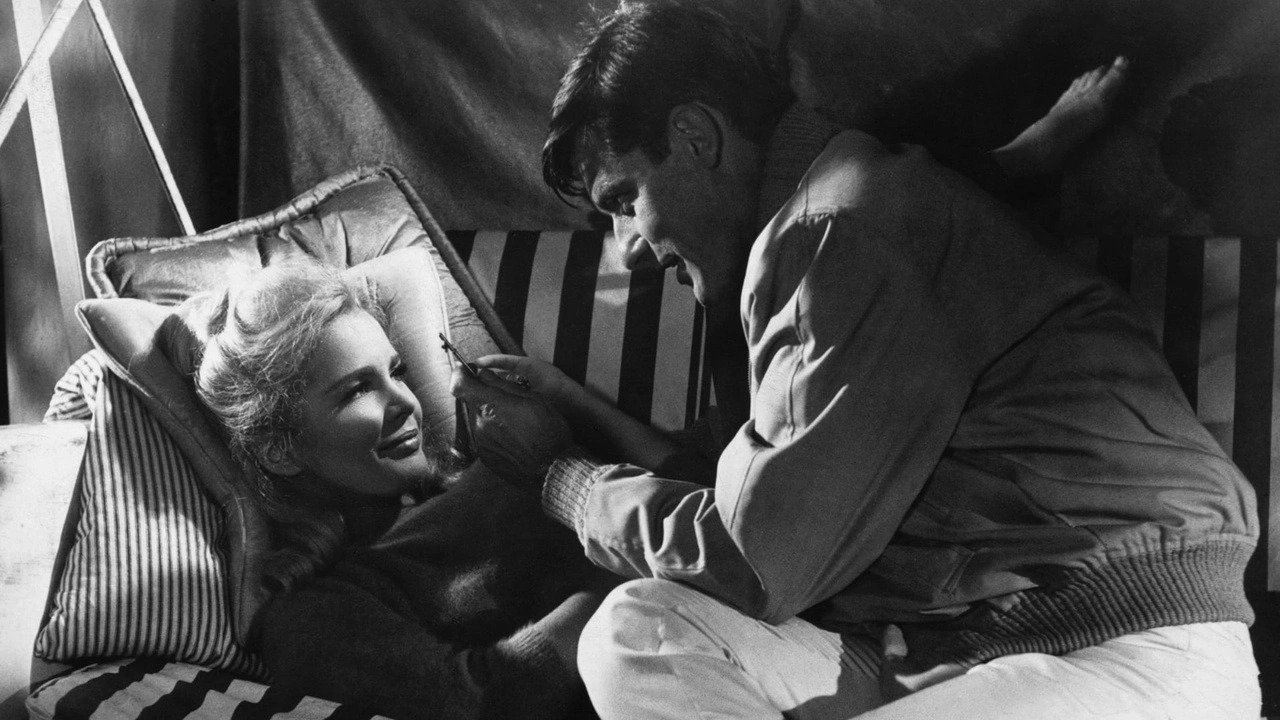What is This Movie? Lord Love a Duck (1966, dir. George Axelrod, US) by Matt Olsen
The primary word that comes to mind when talking about the 1966 teen comedy satire (?), Lord Love a Duck, is “inexplicable”. Because it is, and I dare you, incapable of explanation. I’ve headed this post “What is This?” and, honestly, I still don’t know the answer to that question even after having seen the movie at least six times.
Undeniably, it is a comedy and, at times, a pretty funny comedy. One of the many… let’s call them ‘irregularities’ of LLAD is that the humor – as I perceive it, anyway – doesn’t adhere to a consistent tone. It’s a sneering cultural satire at its heart, grim black comedy at times, absolute slapstick at others, and, very frequently, its intentions remain as much of a mystery as its protagonist, Alan Musgrave aka Mallymauk – “A bird thought to be extinct, but isn’t”. Yes, Roddy McDowall is a high school valedictorian who appears human in all respects but occasionally identifies himself as an extinct bird with flapping wings and a piercing squawk. Additionally, he seems to possess the power of hypnosis and the supernatural ability to grant wishes. Is he a genie? A wizard? Satan Himself? I’m willing to entertain all theories.
The object of his attention is his fellow classmate at Consolidated High, Barbara Ann Green, a cheerful, friendly teenager driven by undirected ambition and fermenting desires. Exactly what Alan/Mallymauk wants from Barbara is foggy. It doesn’t appear to be inherently sexual though the movie is otherwise brimming with eroticism. Near the beginning, Alan rebuffs Barbara’s suggestion that he’s luring her to a lookout point where teenagers ‘park’ by asserting, “Mallymauk doesn’t park. He makes lazy circles in the sky...” Indeed, when they arrive, the two disrupt several other teens’ make-out sessions as a prank, I guess? This leads to a confrontation between the school’s hulking quarterback and a surprisingly victorious Alan. Add martial arts expert to the list – for the powers of Mallymauk are legion.
If his motivation is love, as the movie eventually suggests, his is a very confused approach dominated by jealousy and an off-putting servant / tormentor dynamic. Which, admittedly, is a very apt description of many relationships. So maybe he’s not such a weird creep, after all?
(Hint: Yes, he is.)
As Barbara, Tuesday Weld is fantastic and I’d be astounded if she understood what was going on in this film any more than I do. Despite the schizophrenically shifting styles, she’s always confident, active, and engaging across a wide spectrum of behavioral prompts, including an extended moment of genuine pathos sandwiched between the typically prevalent utter mania.
On that topic, there are two back-to-back scenes comprising four minutes which are guaranteed to bother and bewilder any rational viewer. It’s a combined sequence of madness and discomfort that rivals anything from the world of extreme cinema. The closest relative to the sense of humor deployed here might be found in the difficult frustration comedy of David Lynch, especially some of the Dougie scenes from Twin Peaks.
The setup, for what it’s worth, is that Barbara believes she needs twelve cashmere sweaters to fit in at school. To fulfill her wish, Mallymauk advises her to milk the guilt of her parents’ divorce in order to pressure her father into buying the sweaters.
Thus, Part One.
Barbara and her father (veteran sitcom and character actor Max Showalter) appear in a ninety-second, locked down shot, seated in the front seat of a car, napkins tucked under chins, eating hot dogs at a drive-in restaurant. If I were to guess what direction these two were given, it’d be something like “Oh, you’ve suddenly lost your minds and don’t understand human behavior anymore.” The pair giggle maniacally throughout. They hoot at the act of squeezing mustard on a hot dog. Guffaw with the ketchup. Fall into hysterics over onion rings and apple pie. It’s baffling. But nothing compared to the certifiable insanity of Part Two.
In an apparent clothing store that seems to be very little more than a dozen floor-length curtains and a single table, Barbara and her father (still laughing) sample the selection of sweaters. They comment on the softness of the cashmere and the unusual names of the color varieties. Grape Yum-Yum. Banana Beige. It’s a little heightened but mostly remains within the realm of a normal comedic level of reality. A sales assistant approaches to ask Barbara if she’d like to try the sweaters on and here’s where it goes off the rails.
Barbara scurries behind the curtain and, shortly, reappears in a different sweater, announcing the name of the color. Her father laughs continually - he’s never stopped – and repeats the name in agitated disbelief. Barbara returns with another sweater, another name, more laughing, and so on. As the scene progresses, the camera switches to Dutch angles and the interactions become disturbingly sexually charged. Barbara runs her hands over her sweatered torso, writhing in ecstasy while her father contorts his face and groans. The sound track reaches what can only be called a fever pitch of orgasmic moans, purrs, grunts, and cackles. Words can’t fully express the psychotic frenzy that the audio collage achieves. Her desire now extinguished, Barbara collapses onto a sofa as Mallymauk appears in the reflection of a mirror. He silently mouths his own name in satisfaction of a wish fulfilled. Or something.
This film also stars Ruth Gordon (terrific) and Harvey Korman (I’m not sure) and was directed and co-written by George Axelrod, the screenwriter of The Manchurian Candidate, Breakfast at Tiffany’s, and The Seven Year Itch. So, it’s not so simple to write it off as an outsider mess. The people involved here have years of success and I suspect more or less achieved what they set out to achieve: A very odd, very memorable, truly feral riff on the teen comedies of the sixties. The tagline on the film’s poster read “This Motion Picture Is An Act of Pure Aggression” and I’m willing to believe them. What other choice do I have?
Matt Olsen is a largely unemployed part-time writer and even more part-time commercial actor living once again in Seattle after escaping from Los Angeles like Kurt Russell in that movie about the guy who escapes from Los Angeles.



